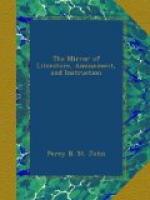After killing a white man, the natives have a sort of dance and rejoicing, jumping, and singing, and sending forth the strangest noises ever heard. They do not molest the body when dead, nor have I ever heard of their stripping or robbing the deceased. Among themselves they have no funeral rites; and those who are aged or diseased are left in hollow trees, or under the ledges of rocks, to pine and die. These people are subject to a disease, which causes the most loathsome ulcerated sores; two or three whom I saw were wretched-looking objects. I remember a very old man, who was thus affected, being tried and hung, for spearing one of Mr. Hart’s men; the culprit was so ill and infirm as to be obliged to be carried to the place of execution. I think the colonial surgeons call the disease the “bush scab;” and that it is occasioned by a filthy mode of life. The population of natives is very small in proportion to the extent of the island: several causes may be alleged for their smallness of numbers; the principal one is their having been driven about from place to place, by settlers taking new locations; another cause is the great destruction of the kangaroo, which obliges the natives to labour hard to procure food sufficient for their sustenance: this, and their having no means of procuring vegetables, besides being constantly exposed to the weather, together with their offensive habits of living, produce the disease above mentioned, with its fatal consequences. Widdowson’s Van Dieman’s Land.
Retrospective Gleanings.
OLD ROSE.
Walton, in his “Angler,” makes the hunter, in the second chapter, propose that they shall sing “Old Rose,” which is presumed to refer to the ballad, “Sing, old Rose, and burn the bellows,” of which every one has heard, but much trouble has been taken, in vain, to find a copy of it.




